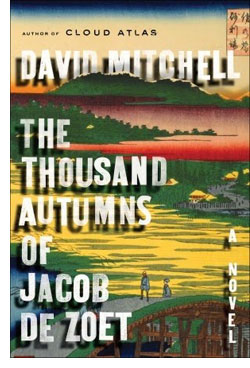 |
 |
 David Mitchell
David Mitchell
The Thousand Autumns of Jacob de Zoet
Reviewed by: Rick Kleffel © 2010
Random House
US Hardcover First Edition
ISBN 978-1-400-06545-5
Publication Date: 06-29-2010
496 Pages; $26
Date Reviewed: 08-09-2010
Index:
General Fiction
Fantasy
Science Fiction
We're surrounded by the things we make; architecture, art, food, culture, business, religion. Each creation is unique, a thing of the moment and marker of that moment in time. Perceived through time, the world we create seems to change, sometimes slowly and sometimes quite abruptly. We record the changes in a variety of media and call them history.
But lost amidst the changes, amidst the things that are built up, torn down, mowed down, destroyed, re-constructed, built over, improved, modernized — are those things which do not change.
The builders, the makers, the artists, the businessmen, the low-level servants, the bureaucrats, those who are appointed our rulers and those who appoint themselves our rules. History, that record of change, is made by the one thing that does not change. Us.
David Mitchell's latest novel, 'The Thousand Autumns of Jacob De Zoet,' (Random House ; June 29, 2010 ; $26), journeys some two hundred years into the past, only to find that humans, ever mutable, always changing their environment, themselves — never change, not really.
Jacob De Zoet, the young Dutch tradesman dragooned to Dejima, a man-made island off Nagasaki, is a man like all of us, marooned. Sent from the Netherlands with the promise of marriage upon return, he finds himself immersed in another world, and another culture; it's not just the weirdly alien culture of Japan that is different.
The artificial world of Dejima is itself an alien world, a tossed-together wreck of trading and traitors, of scoundrels and sailors where, as ever, as even in this very moment of history now, they're making it up as the go. Rules are primarily made, then re-made, the tweezed as they are broken. The only guiding principle resides in the heart of each man and woman. We always, in the end, answer to ourselves.
Mitchell's latest novel is a powerful exercise in building worlds from words, and the words in this novel will simply sweep the reader away. Mitchell's prose is lively, funny, entertaining, and attention-grabbing. He never lets you go and never lets the pace lag. Immersing yourself in the language of this novel is an exercise in the joy of reading. Sentences you never want to forget crowd the pages, riffs you will always remember will fill your mind.
Starting with building blocks of words that are chosen with a care beyond compare, Mitchell crafts a powerful novel of powerless people, people caught in the eternal things we build for ourselves. The businesses that corrupt and cajole, the religions that deny and destroy, Jacob De Zoet and a huge cast of characters come to life between the things they create and the things left to them by those who came before.
Quiet heroes, intelligent scientists, doctors who truly care about the wellness of those they truly serve; these people blossom to life with Mitchell's prose. And though the culture and the setting are almost as alien as any planet dreamed up in the science fiction genre, the people, Mitchell's characters, seem so true-to-human that we, readers here in the 21st century feel that that they could easily step from then to now, that, with a bit of reading, they could easily live. We feel that they are alive, in our hearts, as we read.
Built from prose, enacted by people, Mitchell's story, his plot, his novel is an engrossing, involving reading experience. There is a feeling of fate and a feeling of chaos, mixed in the way our lives mix them. We are in control of our lives and yet our fate is in the hands of those we're unlikely to ever meet. We feel this happen to Mitchell's characters even as it happens in our own lives. 'The Thousand Autumns of Jacob De Zoet' is a riveting vision of a new world, the old world — our world. It is a kaleidescope and a mirror of words.
|
 |
|
|
 |
| |
Review Archive
All Reviews alphabetized by author.
General Fiction
Non-Genre, general fiction and literature.
Horror
Supernatural fiction, supernatural horror and non-supernatural horror.
Science Fiction
Science fiction, science fantasy, speculative fiction, alternate history.
Fantasy
Fantasy, surrealism and magic realism.
Mystery
Crime, thrillers, mystery, suspense.
Non-Fiction
Non-Fiction, True Crime, Forteana, Reference.
Poetry
|
|
 |
|




